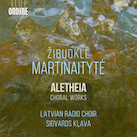

Žibuokle Martinaityte: Aletheia: Choral Works
Ondine
Four engrossing works by Žibuokle Martinaityte (b. 1973) are performed by the Sigvards Klava-conducted Latvian Radio Choir (LRC) on this third Ondine collection of the Lithuanian-American composer's music. In eschewing language or text, the pieces are vocal works in their purest form that grant the choir ample opportunities to showcase its artistry, emotional expressiveness, and stylistic range. Boasting a repertoire that extends from the Renaissance to today, the LRC shows itself well-capable of rendering Martinaityte's scores into physical form, just as it did on its Gramophone award-winning album of John Cage choral works a year ago. The ensemble is in the best possible hands with Klava, who's been its music director since 1992.
That texts aren't sung doesn't mean the four pieces aren't without content or meaning, however; political associations are also part of the mix. Martinaityte has stated that Ululations (2023), for example, might be likened to the ululating of owls in a forest at night or the sorrowful wailing of women whose men are at war fighting and dying for their country. She wrote the titular work in 2022 at the same time as Russian troops were crossing into Ukraine and reasoned that the voice is one of only things people have left when their world is collapsing all around them. Given that the ancient Greek word “aletheia” (which appears in philosophers' writings from Parmenides to Heidegger) translates into English as “disclosure” and “unconcealedness,” Martinaityte wanted to emphasize in her piece the idea of an “uncovered” truth that can only be expressed pre-verbally. As Frank J. Oteri clarifies in liner notes, the four works aren't formally related or connected. In addition to Ululations and Aletheia, the release includes Chant des Voyelles (2018), its title derived from one of cubist sculptor Jacques Lipchitz's bronzes, and The Blue of Distance, a work dating from 2010. Differences aside, all four pieces suggest that Martinaityte was liberated by the absence of standardized texts and was able to give herself totally to her creative impulses.
Aletheia begins softly with ethereal voices suspended and gently floating. As the volume increases and the voices multiply, glissandos create the effect of a keening lamentation. The choir intones with emotive force as their voices rise and fall, the contrast between the male and female members clearly marked. Whereas some passages recall Tuvan-Mongol throat singing and others Ligeti's Lux Aeterna (used by Kubrick in 2001: A Space Odyssey), some distance themselves from others altogether when the voices shriek, wail, and lament. The impact of the work's bolstered too when individual singers extricate themselves from the mass to supplicate separately.
Created when Martinaityte was a 2017 artist-in-residence at the Pocantico Center in the John D. Rockefeller Estate outside of New York City, Chant des Voyelles was inspired by a bronze sculpture that Lipchitz titled after an ancient Egyptian prayer consisting of vowels only. Clouds of overtones form when the vowels sung by the choir members are extended and overlap. A ghostly quality develops when the tones subtly shift; there's also a primordial character to the material, something the composer acknowledges in noting that vowels “are almost the very first sounds we make when we attempt to speak as babies.” After a series of disarmingly beautiful serene episodes, the music swells epically as it advances towards its end. In this setting as well as the other three, emotion is intensely communicated when the vocal material is so direct.
The onomatopoeically titled Ululations distinguishes itself from the others through its use of stuttering effects that, coupled with the pitches Martinaityte chose for the singers, creates a mood of mourning and sorrow. The ululations are first delivered by the female singers in multiple formations before they broaden out to include the males. Similar to Aletheia, individuals separate from the group to soar over the others, and it's the moments where the singers' cascading wails appear that are the most memorable.
While the lulling meditation The Blue of Distance is the first work Martinaityte composed for singers without using a pre-existing text, it was inspired by Rebecca Solnit's A Field Guide to Getting Lost and specifically material in the book titled “The Blue of Distance.” Martinaityte felt that the writer's observation that "things that are very far away look blue even though they aren't and that, as a result, we perceive blue as the color of distance itself” aligned so perfectly with her own thoughts about the sonic intimations of distance in her music that she adopted it as the title. Thirteen years separate it from Ululations, but sonically the distance between them is small.
Martinaityte's clearly award of the power vocal music has when stripped of its traditional text-based dimension. In a 2023 podcast conversation, she described how music “surpasses words; it surpasses the meaning of words because it can go to unknown places and unexplainable places.” So powerful, in fact, are these works, one imagines it might be difficult for her to return to a compositional form that involves setting conventional text to music. The open-ended character of the pieces presented here not only allows for the expression of emotion in an unfiltered form, it also allows listeners unlimited space to project themselves onto the music.
December 2024